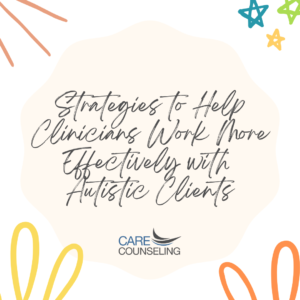Strategies to Help Clinicians Work More Effectively with Autistic Clients
 Mental health providers working with autistic clients are often employed in settings that utilize behavioral, social-relational, and psychological treatment strategies. Autism treatment interventions are available in the home, school, and community-based settings. Many families have treatment teams of professionals to address complementary needs such as working with an occupational or speech therapist for their child in additional mental health and educational support. Since there is a wide variety of interventions that are available, parents and caregivers may have received various opinions and recommendations when it comes to treatment options. The client also has their own experience of the services that are helpful, especially when reflecting on available treatment options, services utilized, and outcome of treatment.
Mental health providers working with autistic clients are often employed in settings that utilize behavioral, social-relational, and psychological treatment strategies. Autism treatment interventions are available in the home, school, and community-based settings. Many families have treatment teams of professionals to address complementary needs such as working with an occupational or speech therapist for their child in additional mental health and educational support. Since there is a wide variety of interventions that are available, parents and caregivers may have received various opinions and recommendations when it comes to treatment options. The client also has their own experience of the services that are helpful, especially when reflecting on available treatment options, services utilized, and outcome of treatment.
Broad categories of treatment include the following:
- Behavioral
- Developmental
- Educational
- Social-Relational
- Pharmacological
- Psychological
- Complementary and Alternative
Balancing the right level of interventions with effective care is ideal as too many services/ transitions can create distress for the client while lacking an adequate level of support impacts functioning. A flexible, integrative approach tends to be best. Also, in my professional experience, I have found that encouraging engagement in activities that build on a client’s strengths while utilizing role modeling/ mentoring and teaching skills has had great results along with the support of therapy.
Let’s look at some common therapeutic interventions utilized for ASD as well as guidelines on some general interventions that can be helpful to incorporate within therapy.
Applied behavior analysis (ABA) is an evidence-based treatment that focuses on reducing inappropriate behaviors and increasing appropriate behavior as defined as what is considered socially acceptable by the culture. Positive reinforcement is used to help teach new skills. The ABC’s of behavior are explored to help understand what occurs before the behavior (antecedents) and after the behavior (consequences). This approach is behavioral and therefore does not focus on addressing the emotional or social aspects of mental health. There may also be limitations with what is considered appropriate/ inappropriate as well as barriers to accessing specialized treatment that can be time-intensive and expensive, depending on insurance coverage.
Cognitive-behavioral therapy (CBT) “talk therapy” may not be very effective or developmentally appropriate for some children, as there is a level of mental understanding needed to understand the techniques utilized that examine thinking, feelings, and behaviors. CBT can be effective in helping autistic clients cope with anxiety and social situations as well as better recognize emotions.
Play Therapy in children with autism is considered more developmentally appropriate than approaches that rely heavily on talk therapy. Play is a wonderful modality to help model, teach social skills, and engage parents while practicing social-emotional reciprocity within interactions. This approach can encourage communication and an outlet for expression in ways that do not heavily rely on language while still encouraging verbal ability.
Therapists in an outpatient setting can utilize elements of ABA, CBT, and play within therapy sessions in addition to strategies that their clients find helpful in meeting their treatment goals such as art or video-modeling. Here are some additional suggestions, provided by my experience as a mental health professional.
- Receive training for working with the autistic population. https://ausm.org/education/training/
- Understand the common co-occurring disorders, how these impact mood and behaviors, and treatment interventions for comorbidity.
- Engage in care coordination such as requesting and reviewing formal evaluations that provide insight and recommendations.
- Create a treatment plan with clearly defined goals that are tailored to each client.
- Think outside the box and be creative, incorporating interests and strengths within treatment.
- Focus on building rapport to create a strong therapeutic alliance within the client-therapist relationship.
- Create predictability and routine within the session, as unexpected events or changes may trigger distress.
- Don’t try to get rid of stimming; alternative stimming behaviors may be explored with the client.
- Promote social-emotional learning, building on areas that are of interest and the therapeutic relationship rather than just focusing on behavior.
- Model and teach the skills needed to be successful in various situations and provide encouragement and support to practice these.
- Help create an environment that feels safe and welcoming.
- Balance engaging the client without creating an overstimulating space regarding sensory stimuli.
- Identify and connect the client to peer and adult role models.
- Provide opportunities for feedback; be willing to adjust your strategies and consult as needed.
Written By: Charlotte Johnson, MA, LPCC



























